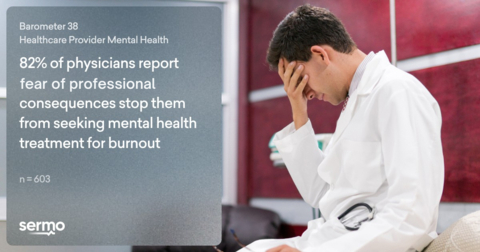Survey of 600+ Global Physicians Examines Experiences of Burnout, Quiet Quitting, Impact on Patients & Employer Solutions
The 38th Barometer from Sermo, a fast, frictionless HCP engagement platform providing the healthcare industry with real-time business insights and authentic physician touch points, found that while physician burnout hit its peak during the COVID-19 pandemic, many physicians are still actively experiencing burnout with 75% of reporting they have seen a colleague experience burnout in the past three months.
This press release features multimedia. View the full release here: https://www.businesswire.com/news/home/20250331843656/en/

Sermo Barometer Finds 82% of Physicians Report Fear of Professional Consequences Stop Them From Seeking Mental Health Treatment for Burnout
The majority (82%) of surveyed physicians reported that fear of professional consequences keeps HCPs from seeking mental health support due to burnout. Among surveyed psychiatrists, this number rises to a staggering 95%. While some progress is being made—with more than half of U.S. states removing licensing questions about mental health treatment, a barrier that long deterred many physicians from seeking help—there’s still more to be done.
Dr. Zachary Horne, a radiation oncologist with the Allegheny Health Network Cancer Institute at the Western Pennsylvania Hospital and Sermo Medical Advisory Board Member, calls for collective advocacy and institutional support to address this growing crisis. “As physicians, we are our best advocates and we need to protect ourselves from ourselves because when there's work to do, we're going to do it. That's why we got into medicine in the first place. We're here to take care of people, but we need to set some boundaries and we need to have allies with our administration to be able to achieve that goal.”
Top Contributors to Physician Burnout:
The Sermo Barometer survey highlighted key contributors fueling burnout, underscoring areas where health systems and policymakers must step in. Physicians identified the following as their top priorities for reducing burnout and improving workplace conditions:
- Reduced administrative workload - The #1 contributor to burnout, with 67% of physicians naming it their top priority.
- Flexible work arrangements - A solution favored by 56% of respondents, especially as work-life balance becomes increasingly critical.
- Confidential mental health support programs - Vital for breaking the stigma and providing a safe space for HCPs in need.
- Nearly half (43%) physicians are either actively pursuing or exploring a hybrid or alternative career path outside of full-time clinical practice due to burnout.
Patients Experience Negative Outcomes of Physician Burnout:
Burnout has a tangible impact on patient care. Physicians ranked the quality of patient engagement as the most negatively affected area of their daily practice. Nearly half (42%) admitted to feeling less empathetic toward patients, while 45% reduced communication outside of regular hours.
Health Systems Aren’t Addressing Quiet Quitting:
While fears about seeking mental health treatment persist, physicians are also engaging in forms of “quiet quitting” that directly impact patient care and institutional efficiency. The majority (79%) of surveyed physicians believe that health systems aren’t effectively recognizing and addressing quiet quitting among healthcare providers. The backlash of physician burnout is tangible. The survey found that physicians actively engage in elements of quiet quitting that could have a substantial impact on patients and administration, including:
- 43% of physicians have minimized documentation efforts.
- 37% have reduced patient hours.
- 43% declined leadership roles.
- 37% avoided professional development opportunities.
- Only 22% of physicians reported taking more time off despite feelings of burnout.
Dr. Horne adds, “We need to have hard stops, so that all of our documentation is done, maybe with the assistance of artificial intelligence to simplify tasks that currently take us 15 or 20 minutes per patient. If we can achieve some boundaries without sacrificing the quality of patient care, then I think we can really make some advancements in terms of reducing physician burnout.”
This survey was fielded from March 10-11, 2025 as the 38th edition of Sermo’s ongoing Barometer study. The survey included 603 global healthcare professionals whose specialties ranged from cardiology, dermatology, endocrinology, gastroenterology, general family practice, neurology, OBGYNs, oncology, pediatrics, and psychiatry. To explore more findings, visit: https://app.sermo.com/barometer.
About Sermo:
Sermo is a fast, frictionless physician engagement platform providing the healthcare industry with real-time business insights and authentic physician touchpoints through our global community of 1M+ healthcare professionals and state-of-the-art technology. For over 20 years, Sermo has been turning physician experience, expertise, and observations into actionable insights that benefit pharmaceutical companies, healthcare partners, and the medical community at large. To learn more, visit www.sermo.com.
View source version on businesswire.com: https://www.businesswire.com/news/home/20250331843656/en/
Contacts
Media Contact:
Allyson Noonan
allyson.noonan@gmail.com
(858) 245- 7256






